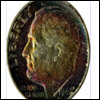
Session Overview
 |
This lecture presents ways of ascertaining how dependable information extracted from samples is likely to be. It covers standard deviation, coefficient of variation, and standard error. It also shows how to use pylab to produce histograms. Image courtesy of Kevin Dooley on Flickr. |
Session Activities
Lecture Videos
- Lecture 15: Statistical Thinking (00:51:31)
About this Video
Topics covered: Variance, standard deviation, standard error.
Resources
Recitation Videos
-
Recitation 6: Probability and Statistics (00:53:28)
Recitation 6: Probability and Statistics
> Download from iTunes U (MP4 - 116MB)
> Download from Internet Archive (MP4 - 116MB)
About this Video
Topics covered: Probability, statistics, Venn diagrams, distributions, standard deviation, Monte Carlo simulation, plotting graphs.
Check Yourself
What does the standard deviation tell us?
› View/hide answer
It is a distance which describes the range +/- from the mean containing a particular fraction of the values; it describes the shape of the bell curve.
What is variance?
› View/hide answer
A measure of how much spread there is in the possible different outcomes.
What is the coefficient of variation?
› View/hide answer
The standard deviation divided by the mean. If it's less than 1, the distribution is considered low-variance.
